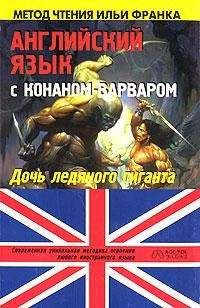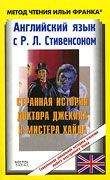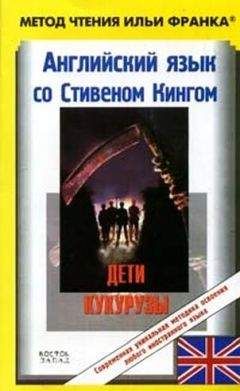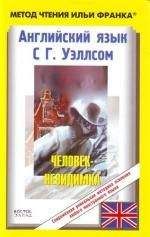Conan pulled his eyes back from following a bold-eyed, red-lipped Ghanara whose short skirt bared her brown thigh at each insolent step (Конан оторвал /свои/ глаза от слежения = провожавшие взглядом красногубую Ганарку с дерзким взглядом: «дерзко-взглядная», чья короткая юбка обнажала ее коричневое бедро при каждом кичливом шаге), and frowned down at his importunate companion (и нахмурился = хмуро посмотрел на своего назойливого собеседника).
"What do you mean by peril?" he demanded (что ты подразумеваешь под опасностью? — спросил он).
The desert man glanced furtively over his shoulder before replying, and lowered his voice (человек пустыни посмотрел украдкой через /свое/ плечо, прежде чем ответить, и понизил /свой/ голос).
whose [hu: z], frown [fraun], mean [mi: n]
Conan pulled his eyes back from following a bold-eyed, red-lipped Ghanara whose short skirt bared her brown thigh at each insolent step, and frowned down at his importunate companion.
"What do you mean by peril?" he demanded.
The desert man glanced furtively over his shoulder before replying, and lowered his voice.
"Who can say (кто может сказать)? But desert men and travelers have slept in the house of Aram Baksh and never been seen or heard of again (но люди пустыни и путники спали в доме Арама Бакша, и их никогда больше не видели и не слышали о них: «никогда были видены и слышаны о снова»; to see — видеть; to hear — слышать). What became of them (что стало из = с ними)? He swore they rose and went their way — and it is true that no citizen of the city has ever disappeared from his house (он клялся, /что/ они встали и ушли своей дорогой — и /это/ правда, что ни один горожанин из города никогда /не/ исчезал из его дома). But no one saw the travelers again (но никто /не/ видел странников снова), and men say that goods and equipment recognized as theirs have been seen in the bazaars (и люди говорят, что товары и снаряжение были увидены = видели на базарах). If Aram did not sell them, after doing away with their owners, how came they there (если Арам не продал их, покончив с их владельцами, как они попали туда; to do away with — покончить с; to come — придти, попасть)?"
who [hu: ], house [haus], equipment [ɪˈkwɪpmənt]
"Who can say? But desert men and travelers have slept in the house of Aram Baksh and never been seen or heard of again. What became of them? He swore they rose and went their way — and it is true that no citizen of the city has ever disappeared from his house. But no one saw the travelers again, and men say that goods and equipment recognized as theirs have been seen in the bazaars. If Aram did not sell them, after doing away with their owners, how came they there?"
"I have no goods," growled the Cimmerian (я имею никаких товаров = у меня нет товара, — прорычал киммериец), touching the shagreen-bound hilt of the broadsword that hung at his hip (касаясь обмотанной шагреневой кожей рукоятки палаша, который висел на его бедре). "I have even sold my horse (я продал даже мою лошадь; to sell — продавать)."
"But it is not always rich strangers who vanish by night from the house of Aram Baksh!" chattered the Zuagir (но /это/ не всегда /только/ богатые чужеземцы, /которые/ исчезают ночью из дома Арама Бакша! — застрекотал зуагир). "Nay, poor desert men have slept there — because his score is less than that of the other taverns — and have been seen no more (нет, бедные люди пустыни спали там — потому что его счет меньше, чем таковой = счет в других тавернах — и их больше не видели). Once a chief of the Zuagirs whose son had thus vanished complained to the satrap, Jungir Khan (однажды вождь зуагиров, чей сын исчез таким образом, пожаловался сатрапу, Джунгир Хану), who ordered the house searched by soldiers (который приказал обыскать дом солдатам: «приказал дом обысканный солдатами»)."
growl [ɡraul], even [i: vn], chief [ʧi: f]
"I have no goods," growled the Cimmerian, touching the shagreen-bound hilt of the broadsword that hung at his hip. "I have even sold my horse."
"But it is not always rich strangers who vanish by night from the house of Aram Baksh!" chattered the Zuagir. "Nay, poor desert men have slept there — because his score is less than that of the other taverns — and have been seen no more. Once a chief of the Zuagirs whose son had thus vanished complained to the satrap, Jungir Khan, who ordered the house searched by soldiers."
"And they found a cellar full of corpses?" asked Conan in good-humored derision (и они нашли подвал, полный трупов? — спросил Конан с добродушной насмешкой).
"Nay! They found naught (нет, они /не/ нашли ничего)! And drove the chief from the city with threats and curses (и выгнали вождя из города с угрозами и проклятиями)! But" — he drew closer to Conan and shivered — "something else was found (но, — он придвинулся ближе к Конану и затрясся, — было найдено кое-что еще)! At the edge of the desert, beyond the houses, there is a clump of palm trees, and within that grove there is a pit (на краю пустыни за домами есть заросли пальм, и в той роще есть яма). And within that pit have been found human bones, charred and blackened (а в той яме были найдены = нашли человеческие кости, обугленные и почерневшие). Not once, but many times (не один раз, а много раз)!"
found [faund], naught [nɔ: t], bone [bəun]
"And they found a cellar full of corpses?" asked Conan in good-humored derision.
"Nay! They found naught! And drove the chief from the city with threats and curses! But" — he drew closer to Conan and shivered — "something else was found! At the edge of the desert, beyond the houses, there is a clump of palm trees, and within that grove there is a pit. And within that pit have been found human bones, charred and blackened. Not once, but many times!"
"Which proves what?" grunted the Cimmerian (которое доказывает что = и что это доказывает? — пробурчал Конан).
"Aram Baksh is a demon (Арам Бакш — демон)! Nay, in this accursed city which Stygians built and which Hyrkanians rule (нет, в этом проклятом городе, который построили стигийцы, и которым правят гирканцы) — where white, brown, and black folk mingle together to produce hybrids of all unholy hues and breeds где белые, коричневые и черные народы смешиваются друг с другом, /чтобы/ плодить гибридов всех нечестивых / жутких оттенков и племен) — who can tell who is a man, and who is a demon in disguise (кто может сказать, кто — человек, а кто замаскированный демон)? Aram Baksh is a demon in the form of a man (Арам Бахш — демон в обличье человека)! At night he assumes his true guise and carries his guests off into the desert (ночью он принимает свой истинный вид и уносит своих постояльцев в пустыню; guise — внешний вид, наружность; вид, видимость; личина), where his fellow demons from the waste meet in conclave (где его приятели-демоны из пустыни встречаются на сборище)."
prove [pru: v], brown [braun], folk [fəuk]
"Which proves what?" grunted the Cimmerian.
"Aram Baksh is a demon! Nay, in this accursed city which Stygians built and which Hyrkanians rule — where white, brown, and black folk mingle together to produce hybrids of all unholy hues and breeds — who can tell who is a man, and who is a demon in disguise? Aram Baksh is a demon in the form of a man! At night he assumes his true guise and carries his guests off into the desert, where his fellow demons from the waste meet in conclave."
"Why does he always carry off strangers?" asked Conan skeptically (почему он всегда уносит чужеземцев? — спросил Конан скептически).
"The people of the city would not suffer him to slay their people (люди города = жители города не потерпели бы его убивать их людей = чтобы он убивал их людей = их близких), but they care nought for the strangers who fall into his hands (но им совершенно наплевать на чужеземцев: «они заботятся ничего для чужеземцев», которые попадают в его руки). Conan, you are of the West, and know not the secrets of this ancient land (Конан, ты с Запада, и не знаешь секретов этой древней земли). But, since the beginning of happenings, the demons of the desert have worshipped Yog, the Lord of the Empty Abodes (но с начала событий = сущего демоны пустыни поклоняются Йогу, Владыке Пустых Обиталищ), with fire — fire that devours human victims (с /помощью/ огня — огня, который пожирает человеческие жертвы).
always [ˈɔ: lwəz], people [pi: pl], secret [ˈsi: krɪt]
"Why does he always carry off strangers?" asked Conan skeptically.
"The people of the city would not suffer him to slay their people, but they care nought for the strangers who fall into his hands. Conan, you are of the West, and know not the secrets of this ancient land. But, since the beginning of happenings, the demons of the desert have worshipped Yog, the Lord of the Empty Abodes, with fire — fire that devours human victims.
"Be warned (будь предупрежден = осторожен)! You have dwelt for many moons in the tents of the Zuagirs, and you are our brother (ты прожил много лун в палатках зуагиров, и ты наш брат)! Go not to the house of Aram Baksh (не ходи в дом Арама Бахша)!"
"Get out of sight!" Conan said suddenly (уйди из виду = скройся! — сказал вдруг Конан). "Yonder comes a squad of the city watch (вон идет отряд городской стражи). If they see you they may remember a horse that was stolen from the satrap's stable (если они увидят тебя, они могут вспомнить лошадь, которая была украдена из конюшни сатрапа; to steal — красть) —»
The Zuagir gasped and moved convulsively (зуагир открыл рот и судорожно дернулся). He ducked between a booth and a stone horse trough (он отступил /в пространство/ между палаткой и каменным желобом-поилкой для лошадей), pausing only long enough to chatter: "Be warned, my brother (остановившись лишь достаточно долго = настолько, /чтобы/ прострекотать: будь осторожен, мой брат)! There are demons in the house of Aram Baksh (в доме Арама Бахша /там есть/ демоны)!" Then he darted down a narrow alley and was gone (затем он бросился по узкой аллее и пропал: «был пропавшим / ушедшим»; to go — уходить, уезжать, идти, ехать).
stable [steɪbl], trough [trɔf], dart [dɑ:t]
"Be warned! You have dwelt for many moons in the tents of the Zuagirs, and you are our brother! Go not to the house of Aram Baksh!"
"Get out of sight!" Conan said suddenly. "Yonder comes a squad of the city watch. If they see you they may remember a horse that was stolen from the satrap's stable —»
The Zuagir gasped and moved convulsively. He ducked between a booth and a stone horse trough, pausing only long enough to chatter: "Be warned, my brother! There are demons in the house of Aram Baksh!" Then he darted down a narrow alley and was gone.
Conan shifted his broad sword-belt to his liking (Конан сместил свой широкий пояс для меча поудобнее: «на свой вкус») and calmly returned the searching stares directed at him by the squad of watchmen (и спокойно ответил на ищущие взгляды, направленные на него отрядом стражников) as they swung past (когда они проходили мимо мерным шагом; to swing — проходить мерным шагом). They eyed him curiously and suspiciously (они разглядывали его с любопытством и подозрением), for he was a man who stood out even in such a motley throng as crowded the winding streets of Zamboula (так как он был человеком, который выделялся даже в такой пестрой толпе, как = которая запрудила извилистые улицы Замбулы). His blue eyes and alien features distinguished him from the Eastern swarms (его голубые глаза и чуждые /для этих мест/ черты /лица/, выделяли его из восточной толпы), and the straight sword at his hip added point to the racial difference (а прямой меч у /его/ бедра добавлял пунктик = /еще одну/ черту к расовому отличию).





